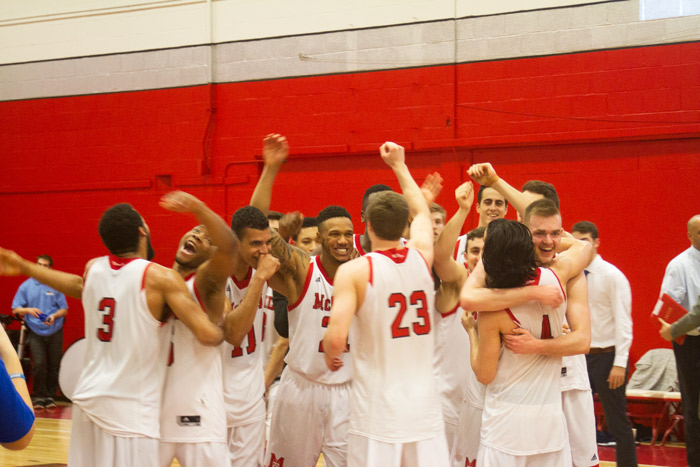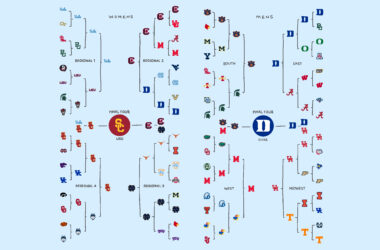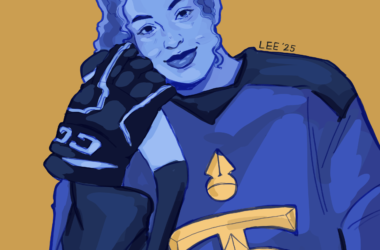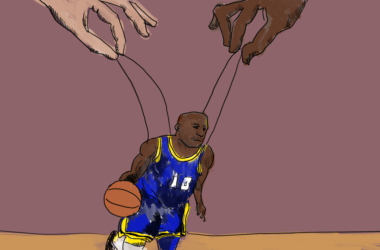Ego is an unavoidable character trait for any human. What differentiates cocky assholes from self-confident success stories is an ability to walk that tightrope between unbridled confidence and cockiness. In basketball, self-assurance is not only encouraged, it is also required for an athlete to be successful at the highest levels of competition.
What happens, however, when you take high school stars, full of brash conviction for so many years, and tell them to sit on the sidelines and simply cheer on their teammates? Many cannot handle the ego-check of going from being a star in high school to riding the bench in college. What is interesting to note is that too much ego can get you in trouble when you’re on the end of the bench, but a dearth of ego can also spell your demise. This is because players must always have the confidence to believe in their skills and abilities so that when their time comes they’re ready to lay it all out on the court in their attempt to move from the bench to a starring role on the basketball team. This is especially significant for redshirting players, college athletes who are withdrawn from competition, and only practice with the team for one year in order to develop skills, and extend their period of playing eligibility by an additional year.
McGill Redmen basketball redshirt freshman Berk Genel acknowledged the difficulty of moving from high school to a top level collegiate varsity team.
“I went from being the best player on my high school team to the exact opposite in terms of roles,” Genel said. “It’s sort of like starting all over again.”
Proving yourself to a whole coaching staff and group of teammates is as taxing physically as it is mentally. This is especially true in college basketball, as players are still growing into adults, and finding themselves under the mental pressure that comes with developing their academic interests. The hope is that this will foster the development of greater mental toughness.
Players who redshirt their freshman campaigns must possess self-awareness and humility. Since they arrived at McGill, these players have experienced an internal transition from a youthful outright love for basketball, to more of an appreciation of the few years they’ll have playing on a collegiate team. They have to be more realistic about their limited role on the team. For freshman guard Parker Joyce, self-perception can influence whether a player accepts their role.
“Depending on how you view yourself as a player, if you know you’re not as good as the other person, it’s easier to accept,” Joyce said. “If you know you’re better than the other person, then it can mess with your mindset, and you struggle with it because you know if it came down to the wire, you could do better.”
Experience is key to handling this situation, as Joyce explained, when speaking about a player who had learned to truly accept his role within the team.
“The older guys are consistent,” Joyce said. “For example [Sebastian Beckett], he accepted his role, he’s a third year, he was brought in, and worked his butt off and is still the hardest working guy. He bullies the bigs and centers that play, he knows his role, and [Head Coach David] DeAveiro has told him multiple times that he’s there to bully guys in practice. He’s consistent and a team guy.”
The other side of this humble approach to varsity sports is the focus that players give towards their academics. As Joyce articulated, the schools in the NCAA that he considered, unless they were Ivy League, are not on par with McGill academically.
“I’m realistic, in the sense that I’m not going to play pro basketball,” Joyce said. “My future goal has always been to be a lawyer, and I also just wanted to be closer to home.”
Playing CIS basketball is highly competitive, and demands a high level of commitment from its athletes, but the majority of its players don’t have a professional future in the sport. Therefore, players must balance their basketball goals with academics, to prepare them for their long-term future.
“The rookie experience on a varsity team in one word?” said Genel. “Grind, it’s just a grind. Just gotta remain positive.”
For players such as Genel and Joyce who are redshirting, the success the Redmen had this season was sweet, but also left a bitter after-taste in their mouths. It’s difficult to not dress for games, arguably be expected to practice harder than anyone else, and then sit on the bench every game and observe. Genel stressed the increased value of practice for players, to not only gain confidence in themselves, but also assert oneself in front of the coaches and teammates.
“It’s a process, you have to wait for your time because you can’t make an impact right away,” Genel said. “You look out on the court and see the players are mostly upper years. You just gotta gain the coaches trust.”
Joyce said that parts of the year are brutal, especially when you are devoting hours of your time to basketball near mid-term and finals seasons, while knowing you are not going to be playing.
“My mindset wasn’t as much about playing a lot,” Joyce concurred. “I was just focused on keeping my head above water, school wise, basketball wise, health wise.”
It was refreshing to hear Joyce discuss the relevance of academics to CIS athletes.
“Everyone here at McGill knows that academics are important,” Joyce said. “Everyone knows, for the most part, that basketball is more or less not gonna sustain you till you retire.”
Listening to a 19-year-old speak about approaching retirement highlights that student-athletes often have to start making difficult decisions about their futures much faster than average university students.
In many ways, the players discussed in this article are at the bottom of the top—the bottom of the team’s hierarchy in one of the top levels of athletic competition. However, to paraphrase rapper and Toronto deity Drake, you have to start from the bottom to get to where you want to be. Where that might be differs from player to player, but every athlete nonetheless desires to make the most of their time at McGill, both as a student, and as an athlete.








